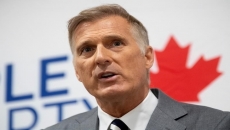Russia's invasion of a sovereign European nation has had wide-ranging energy implications, and is now being used as ammunition by oil and gas sector proponents who offer it as proof that Canada must grow its domestic fossil fuel sector if it wants to ensure energy security.
The Canadian Association of Petroleum Producers (CAPP), the country's largest oil and gas lobby group, called this week for the federal government to make a "clear commitment" to grow Canadian oil and gas development and exports in light of the situation in Ukraine.
CAPP president Tim McMillan said in an interview that Canadian government policies, as well as the environmental and climate change policies of other western countries, have led to the delay and cancellation of major oil and gas projects in recent years.
Some of these projects — like the proposed Énergie Saguenay LNG facility in Quebec, which was rejected by both the provincial government and federal government on environmental grounds — would have connected Canadian energy to customers in Europe, helping to reduce that continent's dependence on Russian supply, McMillan said. (Russia exports approximately 4.5 million barrels per day of oil.)
"Over the last decade, issues like energy security and country of supply have not been very high on the public’s radar," he said, adding that Canadian producers are ready and willing to play a larger role in global energy supply in the decades to come.
"If we act on what we now know, we can build the infrastructure to make this a far more stable world.”
Alberta Premier Jason Kenney this week used the war in Ukraine to tout his province's own oil and gas industry, including criticizing U.S. President Joe Biden for cancelling the Keystone XL pipeline permit, saying "Alberta oil is better than dictator oil."
The cancelled $8 billion Keystone project would have carried roughly 800,000 barrels of oil per day from Alberta to the U.S. Gulf Coast. A number of U.S. Republican lawmakers also criticized Biden this week for killing the project shortly after his inauguration last year.
However, White House press secretary said on an ABC news appearance last week that restarting Keystone is not the answer and that the U.S. needs to reduce its reliance not only on foreign oil, but on "oil in general."
That's a view shared by Canadian environmentalists like Greenpeace Canada's Keith Stewart, who said he believes oil boosters are "overplaying their hand" when it comes to the Ukraine situation.
"I actually think this is going to accelerate the end of the age of oil," Stewart said, adding he believes jurisdictions like the EU will ramp up the push toward renewables and electric vehicles in order to get off of Russian oil.
Stewart said a faster energy transition will be good for not just for the climate, but for global security.
“For the last 80 years, energy security has meant maintaining access to cheap oil by any means necessary, including war," Stewart said. "But no country can block another country’s access to the wind and the sun."
On Wednesday afternoon, benchmark crude West Texas Intermediate closed at US$111.42 per barrel and North American gasoline prices jumped to record highs, driven by fears that Russian supply could be affected by the conflict or western sanctions.
The high prices came in spite of Tuesday's pledge by the International Energy Agency's 31 member countries to release a combined 60 million barrels of oil from reserves in order to calm markets.
Richard Norris — a fellow with The Canadian Global Affairs Institute, a think tank based in Ottawa and Calgary — said he believes there is a segment of the Canadian public that will always be fundamentally opposed to the increased production of fossil fuels, and another segment that will always believe the world needs more Canadian oil and gas.
But he said there's also a segment of Canadians who sit somewhere in the middle, and whose views are likely to be swayed by rising gasoline prices and home heating costs as the Ukraine crisis continues.
"We're going to see increasing inflation driven by a lack of energy policy at a global level," Norris said. "That is the problem we're going to come up against. And I think a lot of countries are going to start doing that math."






